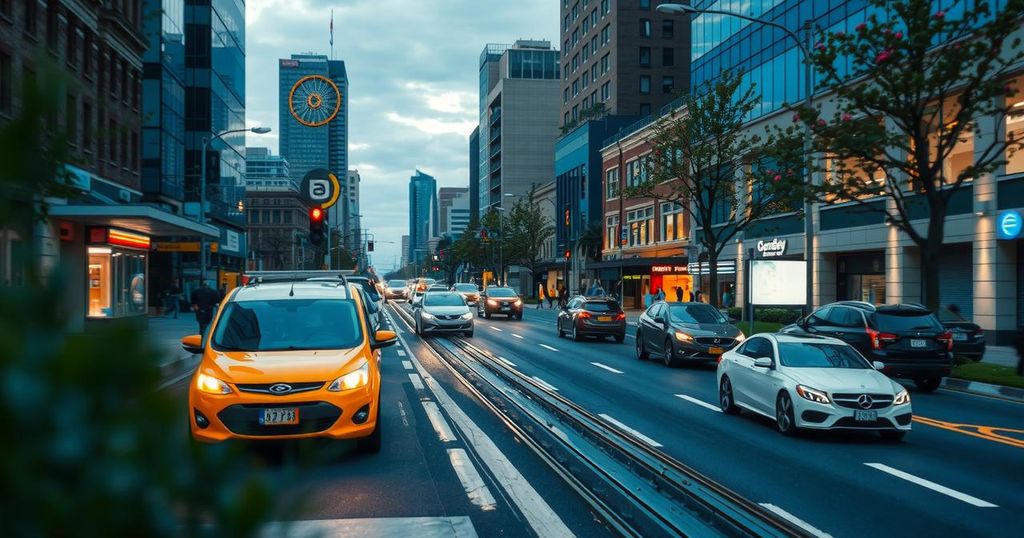Confronting Car Dependence: A Path to Climate Progress and Economic Savings
A study by the Union of Concerned Scientists titled “Freedom to Move” reveals that reducing car dependence could save Americans $6.2 trillion, enhance public health, and advance climate goals. It advocates for diverse transportation options and highlights that cutting vehicle miles traveled by 27 percent could avoid extensive infrastructure costs and fatalities, shifting toward a more equitable transport system. The report critiques the powerful influence of auto and oil industries while promoting inclusive mobility choices for all.
A recent study by the Union of Concerned Scientists discusses the substantial advantages of reducing car dependence in the United States. According to the report entitled “Freedom to Move,” not only would such policies contribute to decarbonizing the transportation sector, but they would also foster healthier and more equitable communities, while generating an estimated savings of $6.2 trillion compared to focusing solely on vehicle electrification. This economic benefit would primarily be returned to American households. The report advocates for a multi-modal approach to transportation, emphasizing the importance of allowing citizens to choose various modes of travel as pivotal for successfully transitioning towards a sustainable climate future. It suggests that by decreasing vehicle miles traveled (VMT) by approximately 27 percent between 2035 and 2050, the nation could avoid constructing approximately $201 billion worth of new energy infrastructure necessary to accommodate the proliferation of electric and gas-powered vehicles during the transition. Moreover, the achievement of this reduction in VMT could lead to a savings of $128 billion from averted public health costs associated with air pollution, as well as the potential to prevent about 250,000 car crash fatalities and 3.7 million injuries, which often incur significant economic costs. Notably, the collective financial relief for U.S. residents could amount to $5.9 trillion, primarily from avoided expenses related to vehicle payments, fuel, and insurance. Kevin Shen, the lead author of the report, elucidates, “What we find is that reducing VMT and making sure to provide more transit options would be the most equitable way to make these kinds of changes, and would provide the most benefits to the people out there.” He emphasizes the potential for households to reduce their reliance on multiple vehicles, suggesting that certain trips could be effectively accomplished through alternative means, such as bicycles. While the reduction of car dependency appears achievable, Shen acknowledges the challenges posed by a century’s worth of ingrained car culture, which has heavily influenced transportation policies and societal norms. The automotive and fossil fuel industries have historically lobbied vigorously against alternatives and have perpetuated a system that largely benefits their interests. In 2023 alone, these industries invested over $104 million in lobbying efforts, seeking to maintain their dominance. The researchers highlight that auto and oil industries currently receive approximately 75 percent of total transportation funding and reiterate that achieving a more sustainable future will demand dismantling the entrenched practices that favor car-centric infrastructure. The report further includes demographic considerations, noting that around 30 percent of Americans do not drive, which includes individuals who are too young, disabled, or otherwise unable to obtain a driver’s license, as well as those who simply cannot afford to maintain a vehicle. The report concludes with a call for a vision of freedom that encompasses diverse transportation options, rather than solely an autonomy tied to automobile usage. “Freedom has long been associated with automobiles. … But we envision a different kind of future: one where invoking the word ‘freedom’ doesn’t mean just ‘freedom to drive,’ but the freedom for everyone to have choices.” – Kevin Shen. Ultimately, the authors of the report assert that understanding the broad benefits of reducing car dependence is crucial for effectively addressing climate change, as well as for serving public health and economic interests.
The report from the Union of Concerned Scientists addresses the urgent need to transition away from a car-dependent society in the United States. It highlights how reducing reliance on vehicles could combat climate change, enhance public health, and promote equitable access to mobility. This perspective emerges against a backdrop of significant lobbying by the automotive and oil industries, which have shaped public infrastructure and policy to prioritize automobility. The study underscores the potential economic benefits and public health improvements associated with diversifying transportation options beyond personal vehicles, framing this shift as a necessary evolution for a sustainable and socially just future.
In summary, the report “Freedom to Move” calls for America’s transition away from car dependency as a multifaceted opportunity that not only addresses critical climate and health issues but also offers significant economic savings. By promoting alternatives to driving, the study envisions a future with increased mobility choices for all individuals, while advocating for the dismantling of barriers imposed by historical car-centric policies. The authors urge a reevaluation of what it means to achieve freedom in transportation, emphasizing inclusivity and the potential for improved quality of life across diverse communities.
Original Source: usa.streetsblog.org




Post Comment